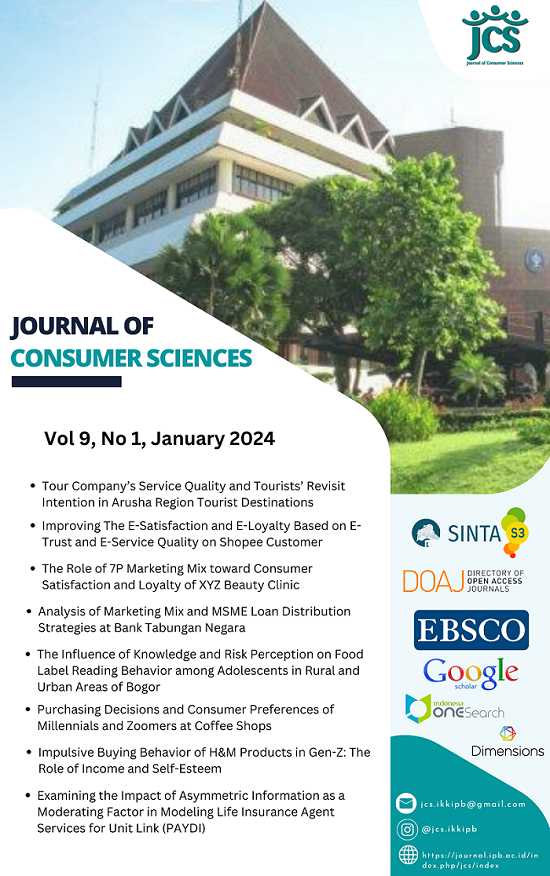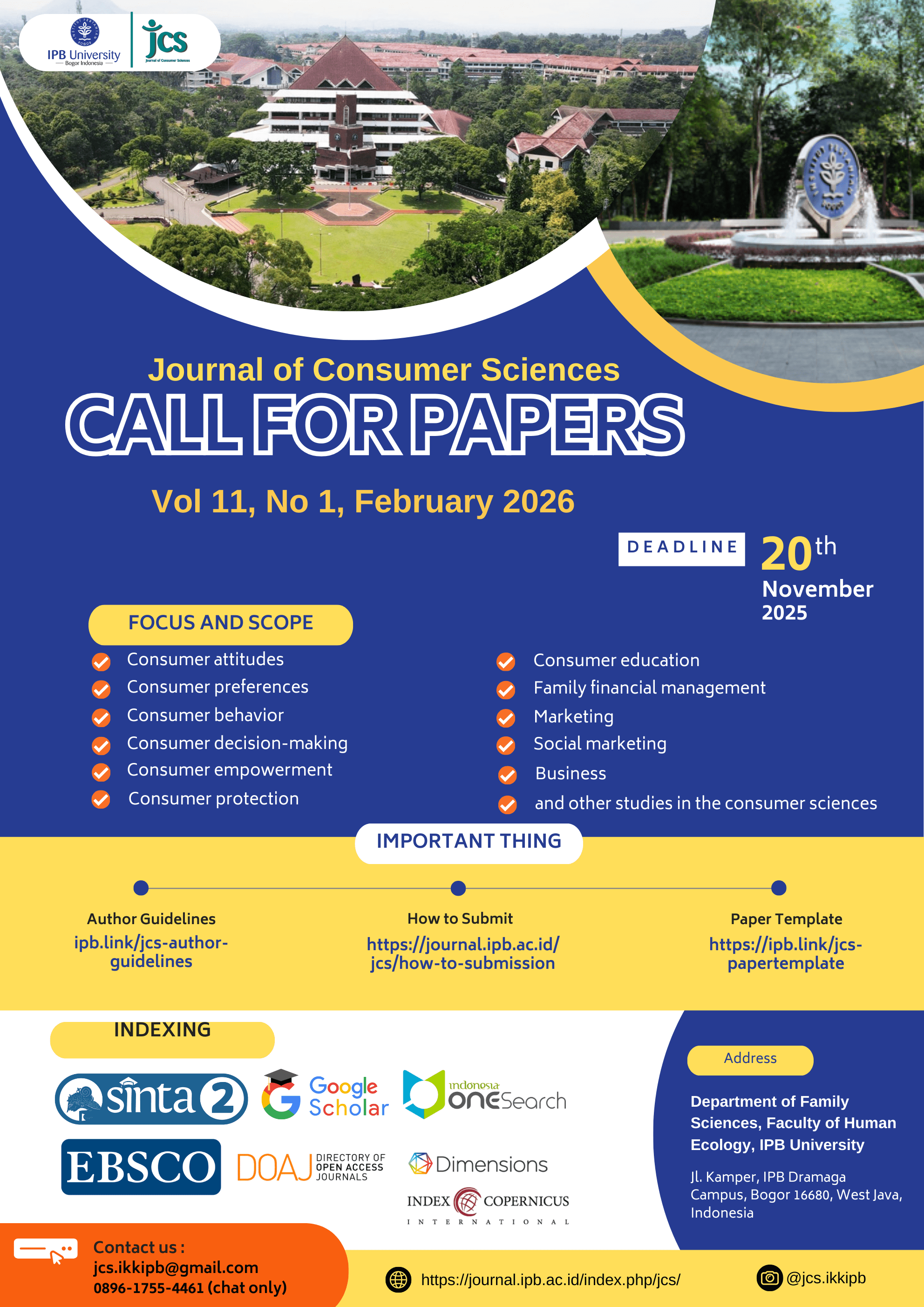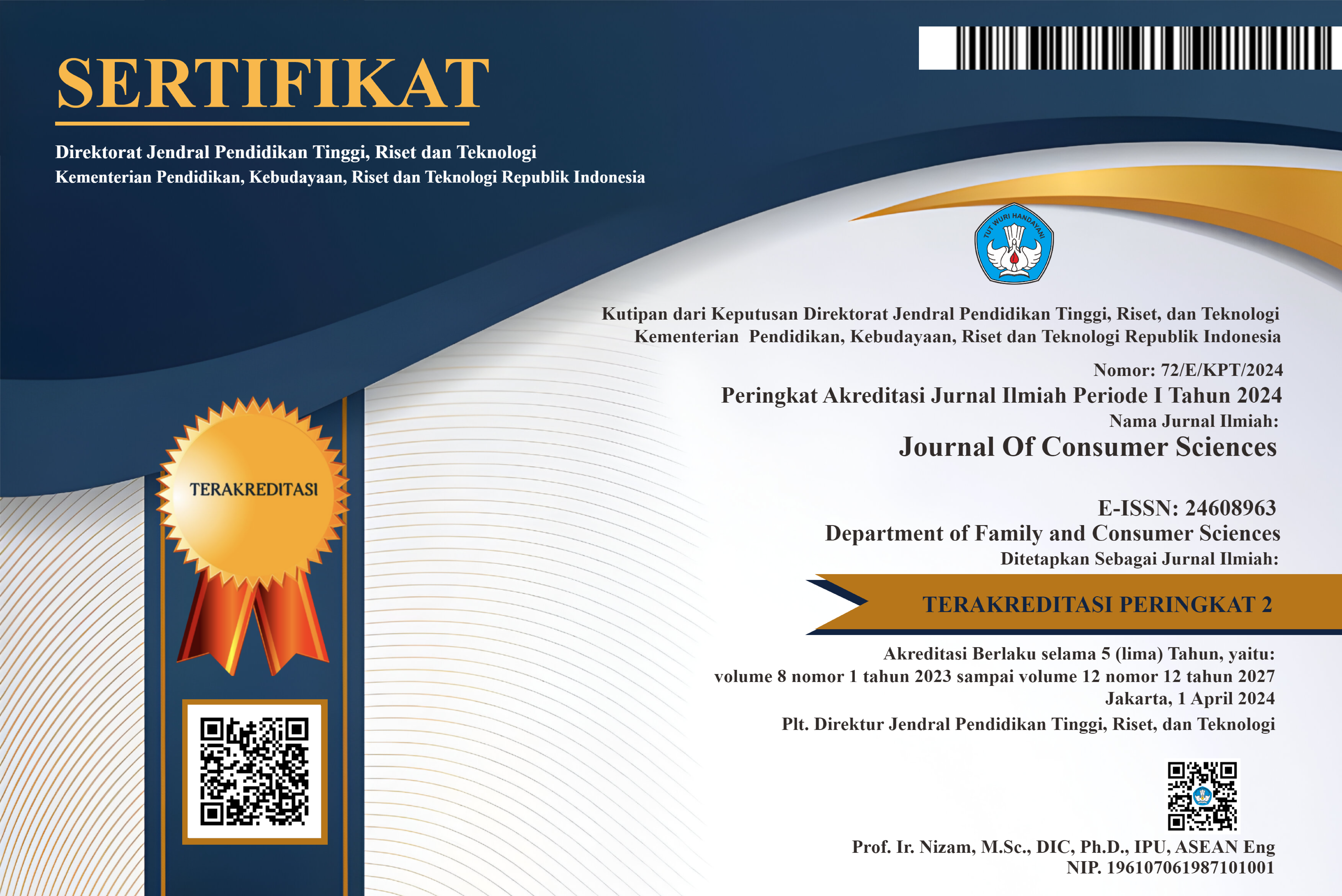Improving The E-Satisfaction and E-Loyalty Based on E-Trust and E-Service Quality on Shopee Customer
DOI:
https://doi.org/10.29244/jcs.9.1.22-39Keywords:
electronic-trust, electronic-service quality, electronic-satisfaction, electronic-loyaltyAbstract
The lack of consumer disloyalty in the shopping process, especially amid Shopee's dominance as a market leader, is the focal point of this research. Shopee managed to achieve top rankings in shaping customer loyalty in the online marketplace. This study aimed to identify several factors that affect customer loyalty on the Shopee platform through trust, good service at Shopee, and satisfaction. Considers related to the important role e-satisfaction plays as a mediating variable in understanding the impact of e-trust and e-service quality on Shopee customer loyalty. A quantitative research design was used, with 100 respondents receiving a questionnaire via Google Form, using simple random sampling techniques in data collection. Data analysis was performed through Structural Equation Modeling (SEM) using the SMART PLS application. Research findings show that the impact of e-trust on Shopee consumer loyalty is quite significant and that the quality of e-service also significantly impacts Shopee customer e-loyalty. In contrast, e-satisfaction is a mediator that significantly affects customers’ e-loyalty levels. Managers must focus on improving the quality of e-services for customer satisfaction. This can include continuous measurement and improvement in website consistency, response speed, and information availability.
References
Annur, C. M. (2022). Situs E-Commerce Dengan Pengunjung Terbanyak Per Agustus 2022. Retrieeved from databoks.katadata.co.id
Andryani, D. (2016, April). Pengaruh attitude, subjective norm, perceived behavioral control pelanggan non-muslim terhadap intention to purchase. In Prosiding Seminar Nasional Cendekiawan. Retrieved from https://e-journal.trisakti.ac.id/index.php/semnas/article/download/200/199
Apidana, Y. H., & Kholifah, K. (2022). Peran self control dalam memoderasi pengaruh hedonic motives dan shopping lifestyle terhadap impulse buying. Journal of Digital Business and Management, 1(1), 26-40. https://doi.org/https://doi.org/10.32639/jdbm.v1i1.38
Asih, R. R. D., & Pratomo, L. A. (2018). Peran mediasi e-satisfaction dan e-trust terhadap e-loyalty. Jurnal Manajemen dan Pemasaran Jasa, 11(1), 125-144. Https://doi.org/10.25105/Jmpj.V10i1.2537
Asih, E. S., & Kasmi, K. (2018). E-Commerce web mobile untuk layanan jual beli hp yang bebasis teknologi. PROCIDING KMSI, 6(1), 83-89. https://jurnal.ftikomibn.ac.id/index.php/kmsi/article/view/624/557
Ashiq, R., & Hussain, A. (2023). Exploring the effects of e-service quality and e-trust on consumers’ e-satisfaction and e-loyalty: insights from online shoppers in Pakistan. Journal of Electronic Business & Digital Economics. https://doi.org/10.1108/JEBDE-09-2023-0019
Ashoer, M. (2019). Pengaruh e-service quality terhadap e-satisfaction pada pelanggan situs toko online brodo. JBMI (Jurnal Bisnis, Manajemen, Dan Informatika), 15(3), 238–251. https://doi.org/10.26487/jbmi.v15i3.4543
Asnaniyah, S. (2022). Pengaruh E-Service quality, e-trust dan e-satisfaction terhadap e-loyalty konsumen muslim. Journal of Comprehensive Islamic Studies, 1(2), 275-302. https://doi.org/10.56436/jocis.v1i2.142
Avania, I. K., & Widodo, A. (2022). Effect of e-service quality on e-customer loyalty through e-customers satisfaction on e-commerce Shopee application. Budapest International Research and Critics Institute-Journal (BIRCI-Journal), 5(1), 5339-5346. https://doi.org/10.33258/birci.v5i1.3641
Bakti, U. (2020). Pengaruh kualitas pelayanan, produk dan harga terhadap minat beli pada toko online Lazada di Bandar Lampung. Jurnal Ekonomi, 22(1), 101-118. https://doi.org/10.37721/JE.V22I1.633
Berliana, C., & Sanaji, S. (2022). Pengaruh e-service quality, e-trust, dan commitment terhadap e-loyalty dengan e-satisfaction sebagai variabel mediasi. Management Studies and Entrepreneurship Journal (MSEJ), 3(4), 2397-2413.https://doi.org/https://doi.org/10.37385/msej.v3i4.902
Gawi, R. M. (2019). Hubungan antara regulasi diri dengan pembelian impulsif pada produk fashion. Jurnal Riset Psikologi, 2(2). https://doi.org/http://dx.doi.org/10.24036/jrp.v2019i2.6201
Hapsari, L. A., & Setyawan, A. A. (2023). Pengaruh perceived usefulness dan perceived ease of use terhadap e-loyalty: peran e-satisfaction sebagai variabel mediasi. Jurnal Penelitian Manajemen. Retrieved from http://eprints.ums.ac.id/id/eprint/107593%0Ahttp://eprints.ums.ac.id/107593/1/Naskah Publikasi UMS Luthvi Attiya Hapsari B100190543.pdf
Hair, J. F . (2017). A Primer on Partial Least Squares Structural Equation Modeling (PLS-SEM). New York (US): SAGE Publications.
Ishak, A., & Luthfi, Z. (2011). The effect of satisfaction and consumer trust on loyalty: a study on the mediation role of switching costs. Journal of Business Strategy, 15(1). Retrieved from https://journal.uii.ac.id/JSB/article/view/3192
Junaidi, F. H., & Sabar, M. (2019). The influence of efficiency, reliability, and responsiveness towards e-customer satisfaction on Redkendi application. International Journal of Innovative Science and Research Technology, 4(12),1057-1064. https://doi.org/2456-2165
Khristianto, W., & Suyadi, I. (2021). The influence of information system and service on customer satisfaction and loyalty in online shopping. International Journal of Academic Research, 4(2), 28–32. Retrieved from https://www.emerald.com/insight/content/doi/10.1108/JEBDE-09-2023-0019/full/pdf?title=exploring-the-effects-of-e-service-quality-and-e-trust-on-consumers-e-satisfaction-and-e-loyalty-insights-from-online-shoppers-in-pakistan
Liani, A. M., & Yusuf, A. (2021). Pengaruh e-trust terhadap e-loyalty dimediasi oleh e-satisfaction pada pengguna dompet digital Gopay. YUME : Journal of Management, 4(1), 138–149. https://doi.org/10.37531/yume.vxix.445
Ling, K. C., Chai, L. T., & Piew, T. H. (2010). The effects of shopping orientations, online trust and prior online purchase experience toward customers' online purchase intention. International business research, 3(3), 63. https://doi.org/10.5539/ibr.v3n3p63
Maziriri, E. T., Chuchu, T., & Rukuni, T. F. (2023). An Empirical appraisal of electronic service quality, customer satisfaction and behavioral intentions within online shopping in South Africa. Journal of Consumer Sciences, 8(3), 234-256. https://doi.org/10.29244/jcs.8.3.234-256
Melinda, M. (2017). Pengaruh e-service quality terhadap e-loyalty pelanggan go-jek melalui e-satisfaction pada kategori go-ride. Agora, 5(1). Retrieved from https://shorturl.at/lnySX
Moliner, M. A., & Tortosa-Edo, V. (2023). Multirooming: generating e-satisfaction throughout omnichannel consumer journey design and online customer experience. Journal of Research in Interactive Marketing. https://doi.org/10.1108/JRIM-05-2023-0149
Oliver, R. L. (2006). Customer Satisfaction Research. The handbook of marketing research: Uses, misuses, and future advances, 1, 569-587.
Parasuraman, A., Zeithaml, V. A., & Malhotra, A. (2005). ES-QUAL: A multiple-item scale for assessing electronic service quality. Journal of service research, 7(3), 213-233. Retrieved from https://journals.sagepub.com/doi/abs/10.1177/1094670504271156?casa_token=L4lMBvZAH-kAAAAA:2hz8Ync5Dwy_lfxguDdyoayfRZPpxnPDj7mgRIzx5xM9j3gjJBWYJdS4xdMRK_D2RTGszwkdGC7Swr8
Rahmah, K., & Satyaninggrat, L. M. W. (2023). The effect of consumer characteristics and lifestyle toward purchase decision. Journal of Consumer Sciences, 8(3), 395-413.. https://doi.org/10.29244/jcs.8.3.395-413
Ranjbarian, B., Fathi, S., & Rezaei, Z. (2012). Factors influencing on customers’ E-satisfaction: A case study from Iran. Interdisciplinary Journal of Contemporary Research in Business, 3(9), 1496-1511. Retrieved from https://www.scribd.com/document/510099473/1496-1511-Factors-Influencing-on-Customers-E-Satisfaction-a-Case-Study-From-Iran
Ribbink, D., Van Riel, A. C., Liljander, V., & Streukens, S. (2004). Comfort your online customer: quality, trust and loyalty on the internet. Managing Service Quality: An International Journal, 14(6), 446-456. https://doi.org/10.1108/09604520410569784
Roisah, R., Ahha, Z. A., & Angliawati, R. Y. (2022). Upaya meningkatkan e-satisfaction melalui e-trust dan e-service quality pada pengguna Shopee Kota Bandung. Jurnal Sains Manajemen, 4(2), 65-76. https://doi.org/https://doi.org/10.51977/jsm.v4i2.745
Safitri, S. N., & Mutmainah, K. (2023). Price discount, bonus pack, in-store display dan financial attitude serta pengaruhnya terhadap keputusan impulse buying behavior konsumen. Journal of Economic, Business and Engineering (JEBE), 4(2), 294-306. https://doi.org/https://doi.org/10.32500/jebe.v4i2.4485
Santika, I. W., & Pramudana, K. A. S. (2018). Peran mediasi e-satisfaction pada pengaruh e-service quality terhadap e-loyalty situs online travel di Bali. INOBIS: Jurnal Inovasi Bisnis Dan Manajemen Indonesia, 1(3), 278–289. https://doi.org/10.31842/jurnal-inobis.v1i3.35
Saragih, M. G. (2019). Pengaruh e-service quality terhadap e-loyalty melalui e-satisfaction (studi pada pelanggan toko online Shopee Di Kota Medan). Jurnal Mantik, 3(1), 190-195. https://doi.org/2580-9741
Sativa, A., & SRI, R. T. A. (2016). Analisis pengaruh e-trust dan e-service quality terhadap e-loyalty dengan e-satisfaction sebagai variabel intervening (Studi pada Pengguna E-Commerce C2C Tokopedia) (Doctoral dissertation, Fakultas Ekonomika dan Bisnis). https://doi.org/10.31933/dijms.v4i3
Tobagus, A. (2018). Pengaruh e-service quality terhadap e-satisfaction pada pengguna di situs Tokopedia. Jurnal Agora, 6, 1–10. Retrieved from https://publication.petra.ac.id/index.php/manajemen-bisnis/article/view/6459/5876
Ulum, F., & Muchtar, R. (2018). Pengaruh e-service quality terhadap e-customor satisfaction website star-up Kaosyay. Jurnal Tekno Kompak, 1(2), 68-72. https://doi.org/https://doi.org/10.33365/jtk.v12i2.156
Wardhana, M. A., Hayati, N., & Akbar, M. N. (2021, December). Analysis of e-service quality, trust, and e-customer satisfaction on Lazada during the COVID-19 pandemic. In Prosiding University Research Colloquium (pp. 477-486). Retrieved from http://repository.urecol.org/index.php/proceeding/article/view/1712
Wilis, R. A., & Nurwulandari, A. (2020). The effect of e-service quality, e-trust, price and brand image towards e-satisfaction and its impact on e-loyalty of Traveloka’s customer. Jurnal Ilmiah MEA (Manajemen, Ekonomi, & Akuntansi), 4(3), 1061–1099. Retrieved from http://journal.stiemb.ac.id/index.php/mea/article/view/609
Yulianto, Y., Alfiah, F., Harahap, E. P., Pahad, B. A., Andriyanto, A., Azhari, I. A., & Saputra, R. S. (2015). Analisa peranan teknologi internet sebagai media transaksi e-commerce dalam meningkatkan perkembangan ekonomi. Semnasteknomedia Online, 3(1), 4-1. Retrieved from https://ojs.amikom.ac.id/index.php/semnasteknomedia/article/view/827/793
Zeithaml, V. A. (2000). Service quality, profitability, and the economic worth of customers: what we know and what we need to learn. Journal of the Academy of Marketing Science, 28, 67-85. Retrieved from https://link.springer.com/article/10.1177/0092070300281007
Downloads
Published
Issue
Section
License
Authors who publish with this journal agree to the following terms:
- Authors retain copyright and grant the journal right of first publication with the work simultaneously licensed under a

This work is licensed under a Creative Commons Attribution 4.0 International License. that allows others to share the work with an acknowledgement of the work's authorship and initial publication in this journal. - Authors are able to enter into separate, additional contractual arrangements for the non-exclusive distribution of the journal's published version of the work (e.g., post it to an institutional repository or publish it in a book), with an acknowledgement of its initial publication in this journal.
- Authors are permitted and encouraged to post their work online (e.g., in institutional repositories or on their website) prior to and during the submission process, as it can lead to productive exchanges, as well as earlier and greater citation of published work (See The Effect of Open Access).

















